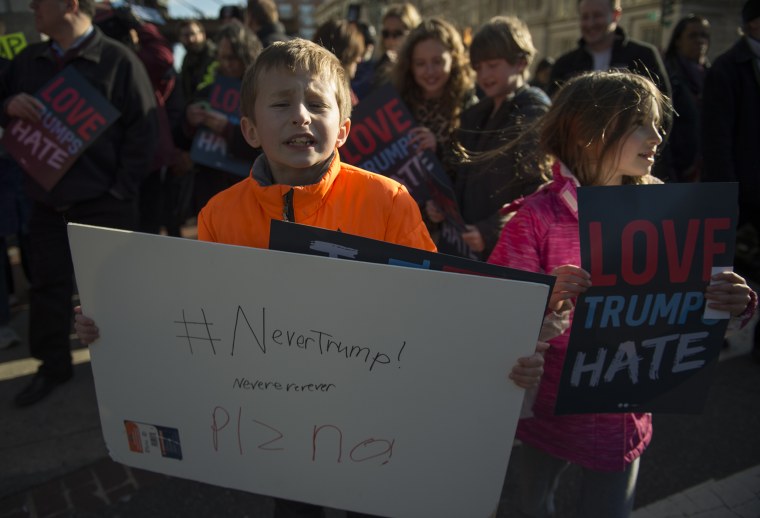Two-thirds of educators teaching grades K-12 reported that school children, mostly of color, are scared and stressed about their future if Donald Trump becomes president, according to a recent Southern Poverty Law Center survey released Wednesday.
A common finding, SPLC reports, is that students of color worry about being deported if Trump wins the election. This anxiety resides particularly with Latino, Muslim and African-American students, even if they are legal U.S. citizens, the report cites. The worries relate to the Republican front-runner's proposed anti-immigrant policies — such as building a wall on the U.S.-Mexico border and banning the entrance of all Muslims into the country. Trump has also called Mexicans "rapists" and did not immediately disavow the support of former Ku Klux Klan leader David Duke and other white supremacists in a February interview with CNN's Jake Tapper.
“My students are terrified of Donald Trump,” said one teacher from a middle school with a large population of African-American Muslims. “They think that if he’s elected, all black people will get sent back to Africa.”
RELATED: Trump earns second most unfavorable rating in poll’s history
The survey, the non-profit social justice oriented organization admits, is not a scientific, random sampled poll. The open online survey conducted between March 23 to April 2 was sent to teachers that subscribed to SPLC's Teaching Tolerance newsletter. SPLC also said the teachers who chose to respond to the survey are likely to be those who are most concerned about the effects of the election in their schools. Two thousand K-12 educators responded, generating more than 5,000 comments. About one-fifth of the comments mentioned Donald Trump, meanwhile less than 200 comments mentioned the names of the other presidential candidates.
According to the survey, teachers said students in second grade through high school have cried in class due to their fears about the election. The anxiety, many teachers said, was also hindering students' grades and ability to concentrate. One teacher from Washington state said a 10-year-old boy couldn't sleep at night because he was worried his immigrant parents would be deported.
More than one-third of teachers also said they saw an increase in anti-Muslim or anti-immigrant attitudes and more than half of educators said there was an increase in uncivil political discourse in the classroom since the election season began. This anxiety is then reinforced through an increase in bullying toward marginalized students. Muslim, Sikh and Hindu students faced heightened levels of abuse in the past few months, the survey added. Across the U.S., Muslim and perceived Muslim students were called "ISIS," "terrorist" or "bomber."
RELATED: Republican candidates assess violence at Trump events
Hostility toward immigrant children, particularly Mexican students, has increased as well. Some students have threatened immigrant classmates that they will be deported soon, and use slurs against them. The survey also noted that many teachers observed an increase in the use of racial slurs, and some African-American students have said they fear slavery will be reinstated.
“At the all-white school where I teach, ‘dirty Mexican’ has become a common insult,” said a Wisconsin middle school educator. “Before election season it was never heard.”
Some teachers said the growing hostility inspired by the election season is undoing previous efforts to fight bullying in their schools. Meanwhile, other teachers reported that the election has not impacted bullying in their schools, noting that their schools have strong values and commitment to civility. More than 40 percent of teachers in the survey said they are hesitant to teach about the election because the topic elevates students' stress. Even with the silence by teachers, it was noted that students are still impacted by the election through the media and other students.
